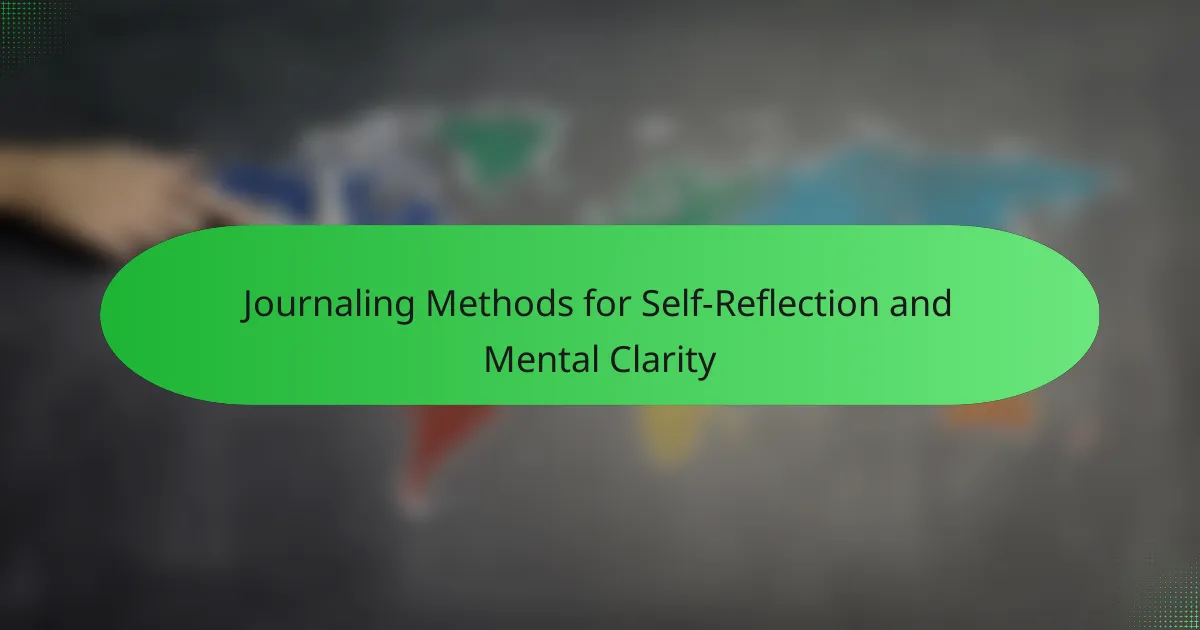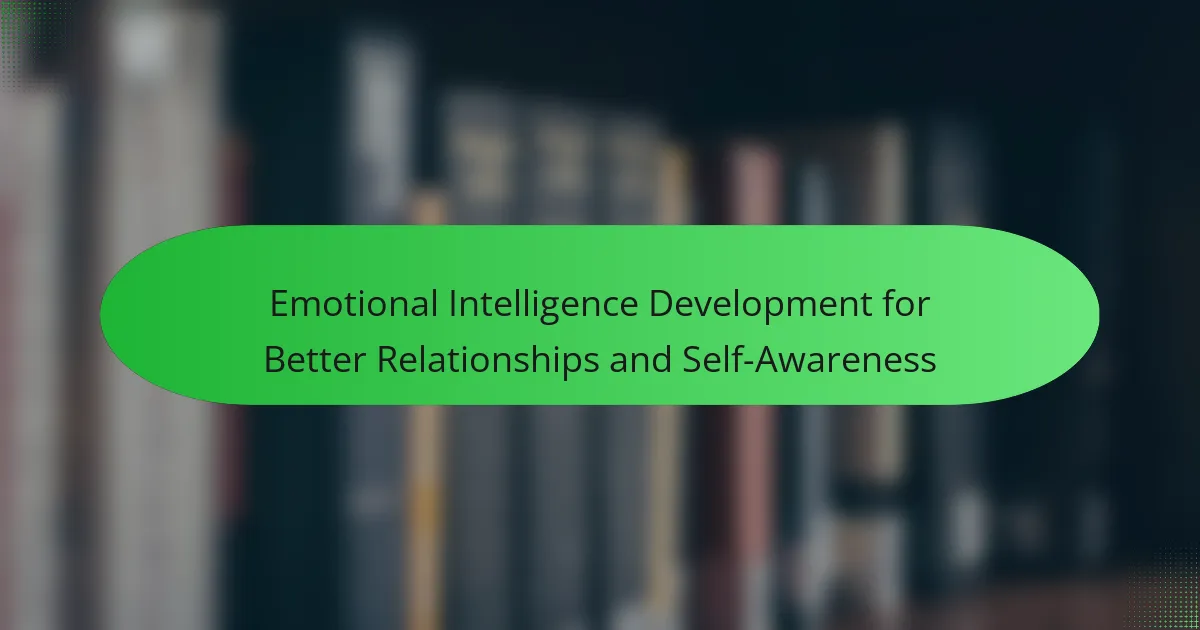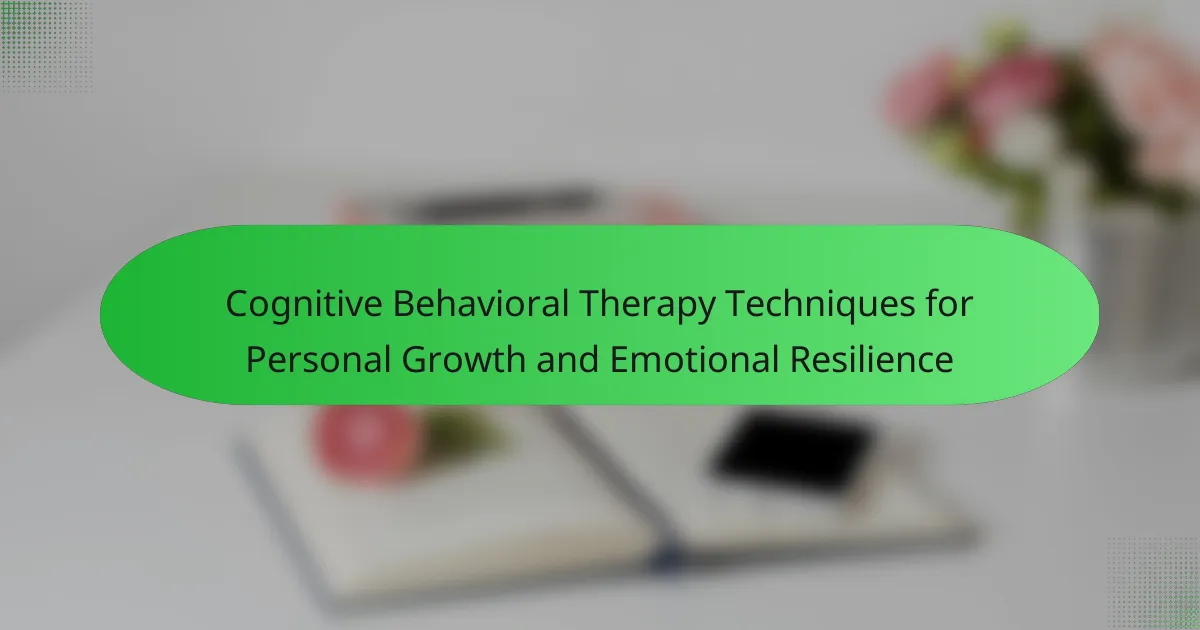Gratitude practices significantly enhance life satisfaction and happiness. Engaging in gratitude exercises can improve mental health, strengthen relationships, and foster a positive mindset. Common methods include journaling, expressing thanks, and mindfulness meditation. Cultural influences shape how gratitude is practiced and can affect overall well-being. Unique approaches like digital gratitude apps and community circles also contribute to emotional resilience and connection.
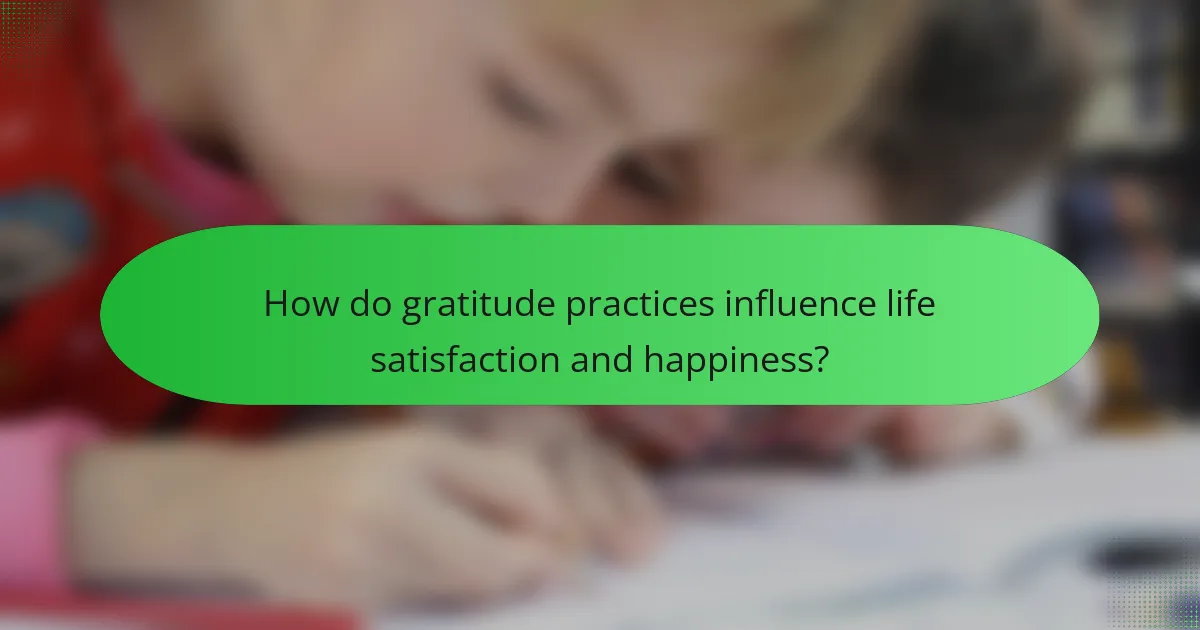
How do gratitude practices influence life satisfaction and happiness?
Gratitude practices significantly enhance life satisfaction and happiness. Regularly expressing gratitude can lead to improved mental health, stronger relationships, and increased resilience. Research shows that individuals who engage in gratitude exercises report higher levels of positive emotions and life satisfaction. For instance, a study found that writing down things one is grateful for weekly can improve overall well-being and reduce feelings of depression. Gratitude fosters a positive mindset, which contributes to long-term happiness.
What are the psychological benefits of practicing gratitude?
Practicing gratitude significantly enhances life satisfaction and happiness. Research shows that gratitude fosters positive emotions, reduces stress, and improves overall well-being. Regular gratitude practices, such as journaling or expressing appreciation, can lead to lasting psychological benefits. Individuals who engage in these practices report higher levels of optimism and lower rates of depression. Additionally, gratitude strengthens relationships by promoting pro-social behavior and increasing feelings of connection.
How does gratitude relate to emotional well-being?
Gratitude significantly enhances emotional well-being by fostering positive feelings and reducing negative emotions. Practicing gratitude can lead to increased life satisfaction and happiness. Studies show that individuals who regularly express gratitude report higher levels of positive affect and lower levels of depression. For example, keeping a gratitude journal can shift focus from negative experiences to positive ones, promoting a more optimistic outlook. Additionally, gratitude strengthens social connections, providing emotional support that further contributes to well-being.
What role does gratitude play in building resilience?
Gratitude plays a crucial role in building resilience by fostering a positive mindset. Practicing gratitude enhances life satisfaction and happiness, helping individuals cope with stress and adversity. Research shows that those who regularly express gratitude experience improved mental health and emotional well-being. This positive outlook allows them to navigate challenges more effectively, reinforcing their resilience.
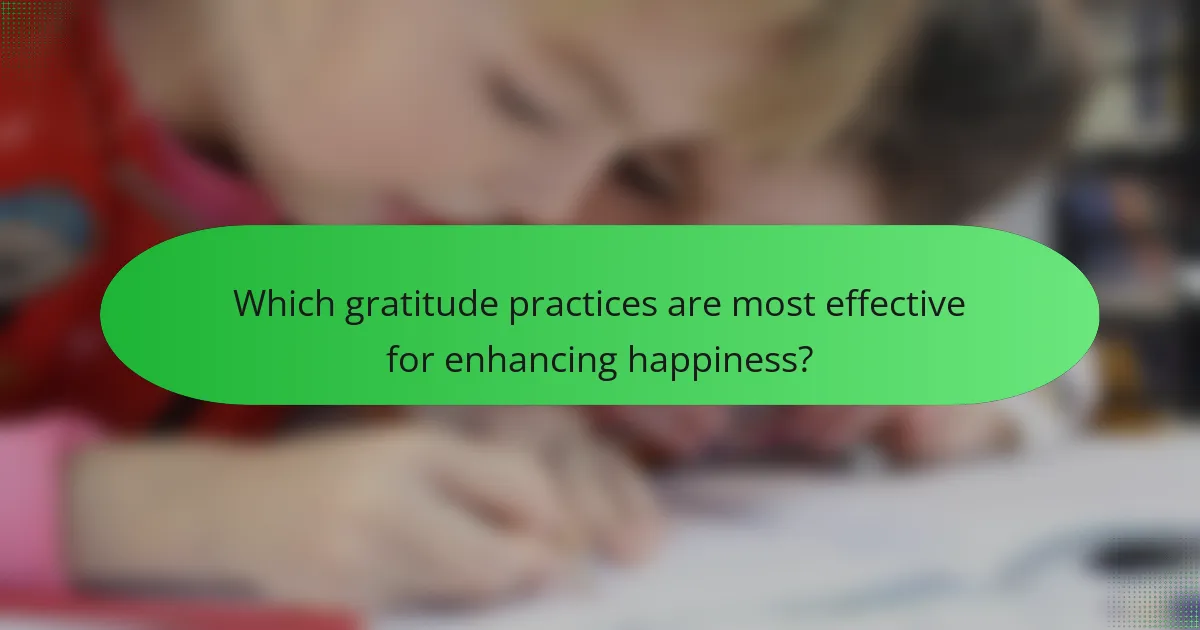
Which gratitude practices are most effective for enhancing happiness?
Gratitude practices like journaling, expressing thanks, and mindfulness meditation are highly effective for enhancing happiness. These practices foster positive emotions and improve overall life satisfaction.
Journaling about things you are grateful for can increase feelings of well-being. Research shows that individuals who regularly write down their gratitude experience more positive emotions and lower levels of depression. Expressing thanks to others strengthens relationships, which is a unique attribute that contributes to happiness. Mindfulness meditation enhances awareness of positive experiences, promoting a grateful mindset.
Additionally, engaging in gratitude exercises consistently can lead to long-term improvements in mental health. Studies indicate that individuals who practice gratitude regularly report higher levels of life satisfaction and emotional resilience.
How can daily journaling improve gratitude levels?
Daily journaling significantly enhances gratitude levels by encouraging reflection on positive experiences. This practice fosters a mindset focused on appreciation, leading to increased life satisfaction and happiness. Regularly noting what one is thankful for can shift attention from negativity to positivity, creating a lasting impact on emotional well-being. Studies show that individuals who maintain gratitude journals report higher levels of optimism and overall life satisfaction.
What impact does expressing gratitude have on relationships?
Expressing gratitude significantly enhances relationships by fostering connection and trust. Regular gratitude practices strengthen emotional bonds and improve overall relationship satisfaction. Research shows that couples who express appreciation experience greater intimacy and reduced conflict. Gratitude shifts focus from problems to positive aspects, promoting a healthier relational environment.
Which mindfulness techniques incorporate gratitude practices?
Mindfulness techniques that incorporate gratitude practices include journaling, meditation, and visualization. These methods enhance life satisfaction by fostering a positive mindset.
Journaling allows individuals to reflect on daily gratitude, increasing awareness of positive experiences. Meditation focuses on cultivating gratitude through mindful breathing and affirmations. Visualization involves imagining moments of gratitude, reinforcing positive emotions.
Research shows that regularly practicing gratitude can lead to improved mental health and greater overall happiness. Incorporating these mindfulness techniques can significantly enhance life satisfaction.
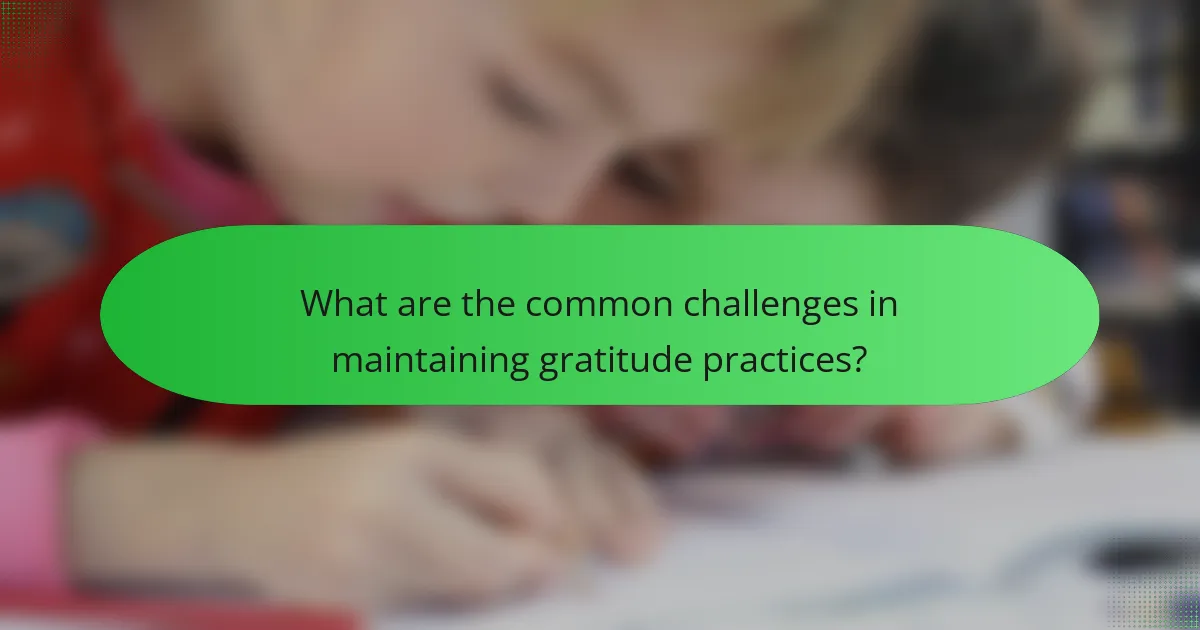
What are the common challenges in maintaining gratitude practices?
Common challenges in maintaining gratitude practices include time constraints, lack of motivation, and difficulty in recognizing positive experiences. Many individuals struggle to consistently integrate gratitude into their daily routines, often due to busy lifestyles. Additionally, some may find it hard to identify and appreciate small moments of joy, leading to a diminished sense of gratitude. Over time, these obstacles can hinder the effectiveness of gratitude practices, impacting overall life satisfaction and happiness.
How can individuals overcome obstacles to practicing gratitude?
Individuals can overcome obstacles to practicing gratitude by adopting simple strategies. One effective method is to maintain a gratitude journal, where daily entries highlight positive experiences. This practice fosters awareness of the good in life, enhancing overall happiness.
Another approach is to set reminders to reflect on gratitude regularly. For instance, scheduling time each week to think about what one appreciates can reinforce this positive habit. Engaging in gratitude exercises, such as expressing thanks to others, can also strengthen relationships and boost life satisfaction.
Additionally, mindfulness techniques can help individuals focus on the present moment, making it easier to recognize and appreciate daily blessings. Practicing gratitude in challenging times can cultivate resilience, turning obstacles into opportunities for growth.
What are the misconceptions about gratitude practices?
Many misconceptions exist about gratitude practices, often hindering their effectiveness. One common belief is that gratitude requires significant effort or time. In reality, simple daily acknowledgments can lead to profound changes in life satisfaction. Another misconception is that gratitude is merely a passive feeling. Instead, it is an active practice that involves consistent reflection and acknowledgment of positive aspects in life. Some people think gratitude is only beneficial during challenging times, but studies show it enhances overall happiness regardless of circumstances. Lastly, many assume gratitude must involve grand gestures, while even small acts of appreciation can yield substantial benefits for emotional well-being.
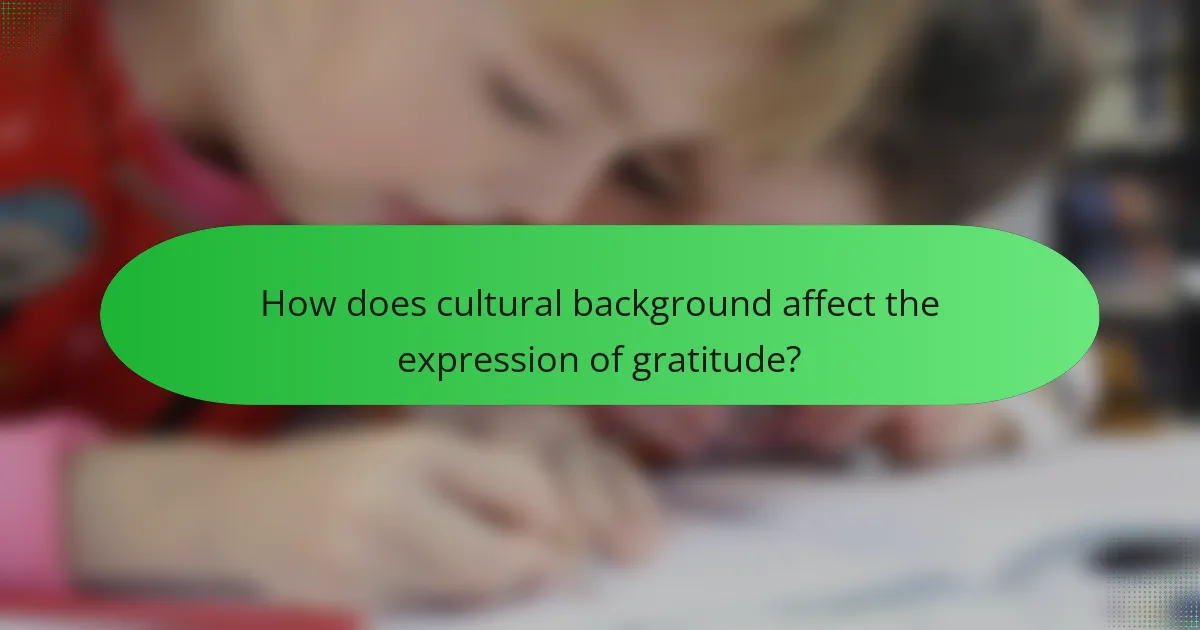
How does cultural background affect the expression of gratitude?
Cultural background significantly influences how individuals express gratitude. Different cultures have unique practices and norms that shape gratitude expressions, impacting life satisfaction and happiness.
For instance, collectivist cultures often emphasize communal gratitude, where appreciation is directed towards the group rather than individuals. This fosters a sense of belonging and interconnectedness, enhancing overall life satisfaction. In contrast, individualistic cultures may focus on personal achievements and direct expressions of thanks, promoting self-fulfillment and happiness.
Moreover, the frequency and formality of gratitude expressions vary across cultures. Some cultures may prioritize verbal expressions, while others might favor actions or gifts as signs of appreciation. This diversity in gratitude practices contributes to varying levels of life satisfaction and happiness across different cultural contexts.
Understanding these cultural nuances can enhance interpersonal relationships and promote a more profound sense of gratitude, ultimately leading to increased life satisfaction.
What are the differences in gratitude practices across various cultures?
Gratitude practices vary significantly across cultures, influencing life satisfaction and happiness uniquely. In Western cultures, gratitude often emphasizes individual expression, while Eastern cultures may focus on communal appreciation. For instance, in the United States, people frequently share personal gratitude through social media, enhancing individual happiness. Conversely, in Japan, gratitude is often expressed through acts of service and respect, fostering group harmony. Research shows that cultures valuing gratitude can enhance overall well-being by promoting social bonds. Understanding these differences can deepen one’s appreciation and application of gratitude in diverse contexts.
How can gratitude be integrated into community initiatives?
Integrating gratitude into community initiatives enhances life satisfaction and happiness. Community programs can include gratitude workshops, volunteer recognition events, and gratitude journals to foster a culture of appreciation.
Research shows that expressing gratitude improves social connections and overall well-being. For example, gratitude practices can increase community cohesion and reduce feelings of isolation.
Additionally, initiatives can leverage social media campaigns to promote gratitude sharing, encouraging community members to express thanks publicly. This creates a positive feedback loop that reinforces community bonds.
By embedding gratitude into the fabric of community efforts, organizations can cultivate an environment where individuals feel valued, leading to increased happiness and life satisfaction.
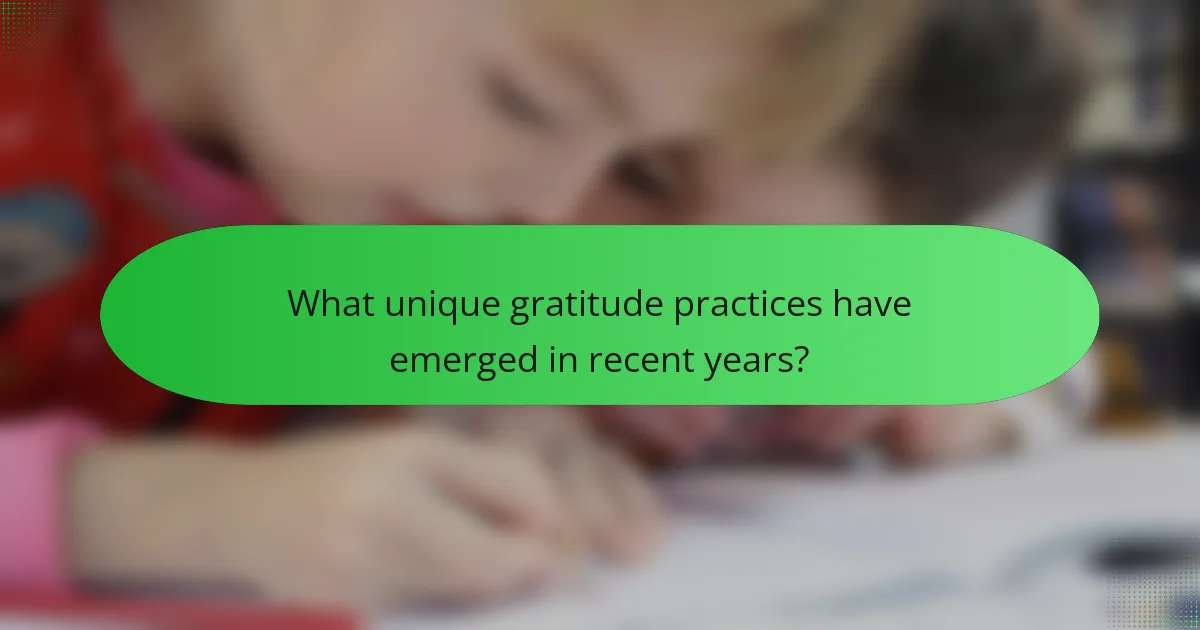
What unique gratitude practices have emerged in recent years?
Unique gratitude practices that have emerged in recent years include gratitude journaling, digital gratitude apps, and community gratitude circles. These practices enhance life satisfaction and happiness by encouraging reflection and connection. Gratitude journaling has gained popularity for its simplicity and effectiveness, allowing individuals to document daily positive experiences. Digital gratitude apps offer reminders and prompts to cultivate gratitude regularly. Community gratitude circles foster social bonds and collective appreciation, enhancing emotional well-being. These innovative methods reflect a growing recognition of gratitude’s role in mental health and personal development.
How are gratitude apps changing the way people practice appreciation?
Gratitude apps are transforming appreciation practices by making them more accessible and engaging. These digital tools encourage users to regularly reflect on positive experiences, enhancing life satisfaction and happiness.
Many gratitude apps incorporate features like reminders, journaling prompts, and community sharing, which foster consistent practice. Research shows that regular use of such apps can lead to increased feelings of well-being, as they help users focus on positive aspects of their lives.
Unique attributes of these apps, such as gamification elements, enhance user engagement, making gratitude practice enjoyable. Additionally, some apps offer personalized insights based on user input, further tailoring the experience to individual needs.
As a result, gratitude apps are not just tools; they are catalysts for long-term positive change in users’ mental health and emotional resilience.
What innovative approaches are being used in therapy to foster gratitude?
Innovative approaches in therapy to foster gratitude include mindfulness practices, expressive writing, and gratitude journaling. These techniques enhance life satisfaction and happiness by encouraging individuals to focus on positive experiences. Mindfulness practices, for example, promote awareness of the present moment, allowing individuals to appreciate small joys. Expressive writing helps articulate feelings of gratitude, reinforcing positive emotions. Gratitude journaling encourages regular reflection on what one is thankful for, creating a habit that can lead to increased overall well-being.
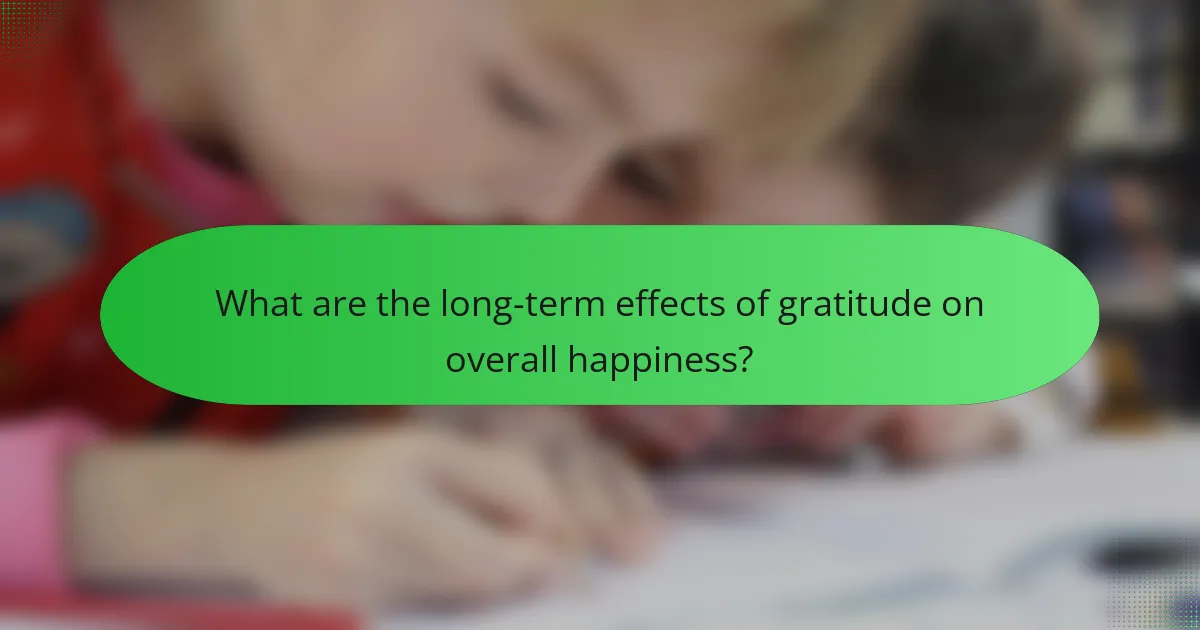
What are the long-term effects of gratitude on overall happiness?
Gratitude practices significantly enhance long-term happiness. Regularly expressing gratitude fosters positive emotions and strengthens relationships, contributing to overall life satisfaction. Research shows that individuals who practice gratitude report higher levels of well-being and lower levels of depression. Additionally, maintaining a gratitude journal can lead to lasting improvements in mood and emotional resilience.
How does gratitude impact physical health over time?
Gratitude positively impacts physical health over time by reducing stress and enhancing overall well-being. Regular gratitude practices have been linked to lower blood pressure, improved sleep, and stronger immune function. Participants in studies report fewer health complaints and increased energy levels. Over time, these benefits contribute to a healthier lifestyle and greater life satisfaction.
What research supports the correlation between gratitude and life satisfaction?
Research consistently shows a strong correlation between gratitude and life satisfaction. Studies indicate that individuals who practice gratitude experience higher levels of happiness and well-being. For example, a 2010 study published in the Journal of Personality and Social Psychology found that participants who kept a gratitude journal reported increased life satisfaction compared to those who did not. Furthermore, a meta-analysis in 2018 highlighted that gratitude interventions can lead to significant improvements in mental health, including reduced symptoms of depression and anxiety. These findings suggest that cultivating gratitude can enhance overall life satisfaction and happiness.
What practical tips can enhance the effectiveness of gratitude practices?
To enhance the effectiveness of gratitude practices, incorporate specific strategies that deepen your experience. Regularly express gratitude through journaling, which can solidify positive emotions. Set aside time daily to reflect on three things you appreciate, fostering mindfulness. Share your gratitude with others, as verbalizing thanks strengthens relationships. Lastly, visualize the positive impact of gratitude on your life, reinforcing its benefits and encouraging a consistent practice.
